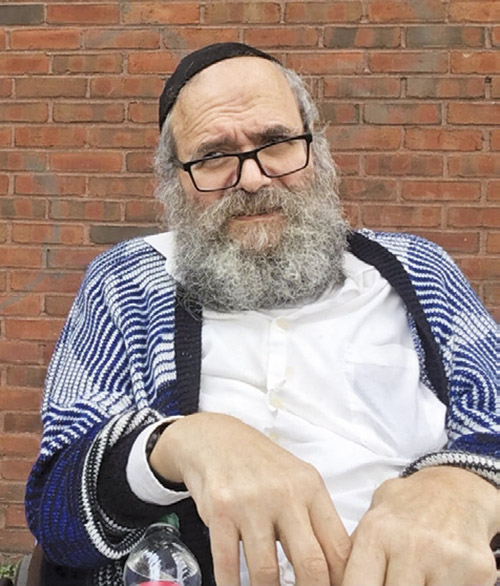
Anyone who has davened at the 2:30 p.m. Mincha in Yeshiva University’s Glueck Beis Midrash over the past few weeks has noticed the chazan reciting a chapter of Tehillim afterward. Unfortunately, the person for whom those Tehillim were said has now passed away. YU has lost Rav Moshe Ashen, z”l, long-time mashgiach of the YU cafeteria, student of Rav Yosef Dov Soloveitchik, z”l, and talmid chacham par excellence.
Growing up in Washington Heights, my earliest memories of davening were when my father took me to the nusach Sefard minyan in Zysman Hall’s Room 101 on Shabbos morning. Sadly, this minyan has disappeared due to the deaths of most of its mitpallelim: old-timers such as Rabbi Nosson Friedman, z”l, and Rabbi Harry Nussenbaum, z”l. This was a unique minyan at YU, or really anywhere, with its homey, almost shtiebel-like atmosphere (enhanced by the weekly kiddush held afterward). Rav Moshe Ashen served as ba’al korei and chazan, as well as ba’al tokei’ah on Rosh Hashanah. While Rav Ashen was sometimes hard to hear when he spoke to people, his kriyat haTorah was impeccable and unmistakable; every syllable was enunciated clearly and precisely. The sound of Rav Ashen’s Torah reading still rings in my ears, serving as the first example of leining for me and setting high expectations for all leining I would hear in the future.
When I got a bit older, I was fortunate to take advantage of Rav Moshe Ashen’s vast Torah knowledge in addition to his leining and davening for the tzibur. Rav Ashen was truly a baki in all of Torah; as several maspidim noted at his funeral (available on YUTorah), he never forgot anything he learned, including the shiurim of his rebbi, Rav Soloveitchik, and was able to quote the Shach and Taz on Shulchan Aruch from memory. But as his nephew, Rabbi Yisrael Ashen, noted in his hesped, Rav Moshe’s prodigious memory came from his incredible love for and devotion to Torah. Rav Yisrael Ashen related how he would learn with his uncle before the Shabbos day meal and then accompany him to the meal. On one occasion, after they were learning Shulchan Aruch, Rav Yisrael went to leave the beit midrash and noticed that his uncle wasn’t with him. He went back to the beit midrash and saw that his uncle had reopened the Shulchan Aruch, reviewing what they had learned to make sure he had it memorized. Rav Yisrael told his uncle, “We have to go now” and began leaving, until he noticed again that his uncle wasn’t with him. He turned back and saw that his uncle had gone back to the beit midrash again, reopened the Shulchan Aruch and continued reviewing. This repeated itself once more until Rav Moshe was finally able to tear himself away from the Shulchan Aruch. Rav Hershel Reichman put it succinctly, borrowing a turn of phrase from Rav Soloveitchik: some people learn Torah, while others are Torah. Rav Moshe Ashen made his Torah learning into who he was.
The maspidim also noted Rav Ashen’s chesed. With all his knowledge and understanding of Torah, he could have easily focused all his attention only on the highest level learning of which he was capable. But instead, Rav Ashen was always available to talk to people about what they were learning, to answer their questions and give them tips. Two years ago, when Rav Ashen was in a rehabilitation center, I visited him and told him I was learning Chullin. He asked which perek, and when I told him Kol Habasar (which discusses the laws of basar b’chalav, in which Rav Ashen was particularly proficient), he gave me a very valuable piece of advice: I should learn the first few blatt with just Rashi and without Tosafot, and only look at Tosafot afterward, because those Tosafot constantly quote the Gemara later in the perek, and looking at them without seeing the Gemara first would be a recipe for confusion. I followed Rav Ashen’s advice and was very glad I did.
Rav Moshe Ashen used Torah to shape his personality in the most positive of ways. His sense of yirat shamayim was palpable, and no more than a few minutes could go by in his company without his sharing some words of Torah. He was also a master storyteller, regaling me with tales of Rav Soloveitchik that often concluded with his uproarious laughter at a witty comeback or clever saying of the Rav. In his presence I felt a sense of connectedness to the mesorah of the yeshiva and the previous generation of Torah leaders. Yet his unassuming appearance meant that so many people who never had conversations with him passed him by, thinking him no more than a simple cafeteria mashgiach. The lesson I take from his passing is a sobering one: Let us all appreciate the great people hidden in our midst before it is too late for us to benefit from their wisdom. May his neshama have an aliyah in Gan Eden, where he is once again reunited with his beloved rebbi, and may his memory always be for a blessing in the batei midrash and cafeterias of YU.
(A modified version of this article appeared in the YU Commentator.)
David is a senior at Yeshiva University and a lifelong resident of Washington Heights.













